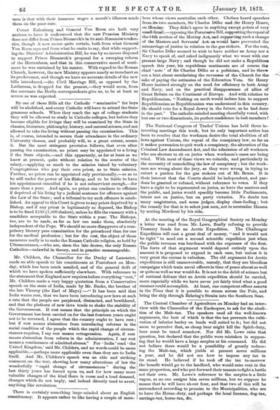There is certainly something large-minded about an English constituency. It
appears rather to like having a couple of mem- There is certainly something large-minded about an English constituency. It appears rather to like having a couple of mem-
hers whose views neutralise each other. Chelsea heard speeches from its two members, Sir Charles Dilke and Sir Henry Hoare, on Monday. They didn't agree in anything except points of very small detail,—opposing the Permisaive Bill, supporting the repeal of the 14th section of the Mutiny Act, and supporting such a change- of the Masters and Servants' Act an would have prevented the miscarriage of justice in relation to the gas stokers. For the rest, Sir Charles Dilke seemed to wish to have neither an Army nor a Navy to speak of, and asked indignantly what we want with our present large Navy ; and though he -did not make a Republican speech this year his republiean sentiments are of course the chief 'note' of Sir Charles Dilke as a politician, and he threw out a hint about secularising the revenues of the Church for the- sake of paying the estimates of the Education Vote. Sir Henry Hoare insisted strongly on the need for efficiency in both Army and Navy, and on the practical disappearance of allies of Great Britain on the Continent of Europe. And with relation to- Republicanism, "Nothing on earth would induce him to support Republicanism as Republicanism was understood in this country. He should vote for a Royal dowry in the future, as he had done in the past." The catholic-minded meeting cheerfully voted, with but one or two dissentients, its perfect confidence in both members!


































 Previous page
Previous page